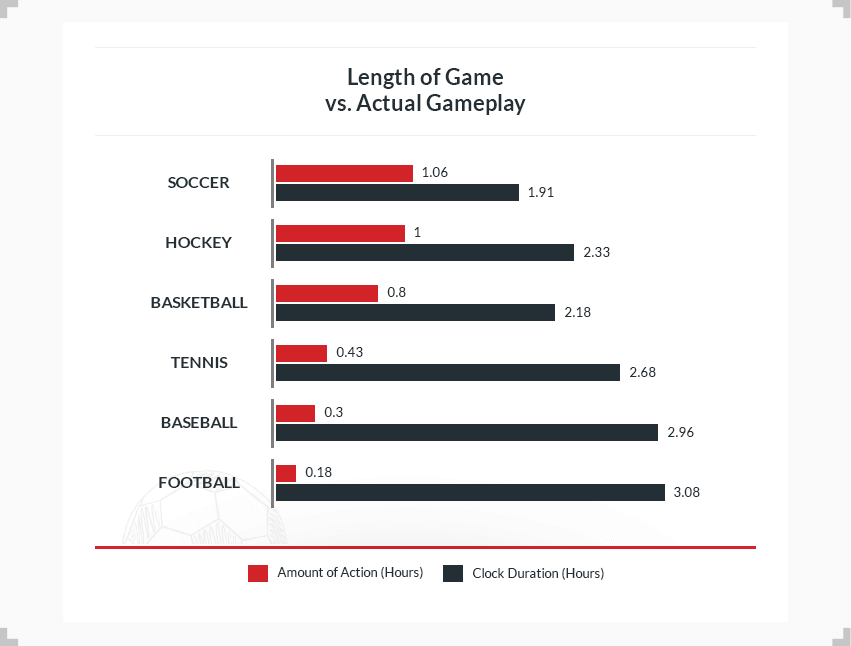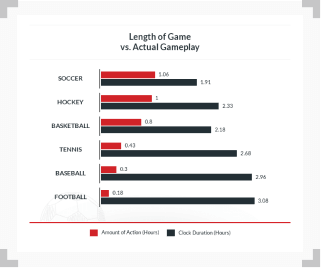Betting on Soccer: Weighing the Pros and Cons

If you’re new to soccer betting you may be wondering how it stacks up against other conventional American sports. Perhaps you’re new to the soccer in general, and you’re curious as to what you can expect before placing your first bet.
Wondering how long the soccer betting season is? Confused about the time that gets added onto the end of games, often referred to as “Injury Time”? We’ll take a look at all of this and much more as we dive into the pros and cons of betting on soccer.
Soccer Betting: What Are You Committing to?
In today’s hectic world, it can often be hard to carve out the time to research, bet, and then watch all the games you want to. Sometimes this is even harder when you can’t be sure exactly when the game you’re watching will end.


If you’re watching an NFL, NBA, MLB, or NHL game you may have a decent idea of when the game will end, but you can’t really ever be 100-percent sure. Every one of those leagues’ games has the potential of going into overtime, or in the case of hockey, a shootout.
What all these sports also have in common is that they run on stopped time. Or in baseball’s case, no clock at all; though the sport has begun to experiment with a pitch clock.
Let’s get back to soccer. Soccer games are played on running time, that is the game clock never stops throughout the match. A regular season match in soccer includes two 45-minute halves. While the referee will blow the whistle to stop gameplay for goals, injuries, fouls, etc., the actual game clock will continue to run.
What that means is that outside of a 15-minute half-time, the clock will run all throughout each half, also leaving no opportunity for commercial breaks. Unless the match is an elimination game during a tournament, for your typical regular season match, you’re pretty safe to pencil yourself in for a two-hour commitment.
This is because soccer, unlike other sports, can finish in a tie or draw during regular season matches. From a betting standpoint, this is why you will see three-way moneyline options when placing your bets.
What Exactly Is Injury Time, and How Is It a Betting Consideration?
But wait, I’ve watched soccer before, the game has ended, and they’ve kept playing… And playing… What gives?
The positive of soccer’s running game clock can also turn into a negative for those who are more comfortable watching a clock tick down to the final seconds of conclusion in other sports rather than watching the time increase.
The additional time at the end of either half has a few names. Whether you call it added time, stoppage time, or injury time, the concept is something that still confuses those unfamiliar with the format.
Basically, the added time is determined by the referee as they keep track of the stoppages during the game on their stopwatch. Whether those stoppages be from injuries, lengthy goal celebrations, or time-wasting, in theory, all of these stoppages will be added on to the end of each half.
Now we say “in theory” because the amount of added time is still subjective to each referee. What further complicates matters is that more time can be added on top of the existing added time. That is, imagine a game reaches the 90-minute mark and the referee indicates there will be three minutes of added time. However, during those three minutes, there could be more stoppages, resulting in the referee adding a little more time to the match.
When you consider that added time is not put on the scoreboard, bettors really have no concrete way of knowing how long they need to wait to until their bet is graded. Furthermore, most referees will only blow the final whistle when neither team is in the middle of a scoring chance.
Unless there is a major injury or weather delay, typically added time will only consist of a few minutes. But the fact is, as a bettor, you’ll likely find yourself throwing your hands up in frustration sooner or later for a game not ending soon enough, or begging the referee to keep adding more time on if your team is behind.
Soccer Season Is All Season
One thing is certain when it comes to soccer betting, bettors will never have to wait too long to find their next match to wager on.
Most major European leagues will begin preseason in the month of July, with a regular season starting in August and running into May of the following year. All things considered, you’re looking at a two-month offseason at most.
From a regular season standpoint, following and betting a league is relatively straightforward. In a league like the English Premier League, there are 20 teams and each team plays each other twice. Once at home and once on the road. This equates to a 38-game schedule.
In this balanced schedule, soccer bettors won’t have to worry about doing hours of research calculating a team’s “strength of schedule” as they may have to do in a sport like American football.
MLS Betting Never Takes a Vacation
If you’re a bettor of Major League Soccer (MLS) in America as well as European leagues, then you basically will have no offseason when it comes to betting soccer. MLS preseason begins early in the new year, followed by CONCACAF Champions League (CCL) beginning in February for some teams, and a regular season beginning in March. The MLS Cup final won’t take place until late November, meaning your calendar of soccer betting can fill up very quickly. The season schedule is just one difference between soccer in America compared to soccer in Europe.
And that is only counting MLS and the major European leagues. Most sportsbooks will offer bets of all kinds on leagues that take place all across the globe throughout the year.
Bettors Need to Follow Multiple Competitions
Betting on soccer starts to get confusing when you factor in the many different competitions a team can be playing in at any given time. While regular season matches will usually only take place once or twice a week, teams are involved in numerous domestic and international competitions throughout the year as well.
Tournaments like Champions League, Europa League, FA Cup, Copa del Rey, CCL, US Open Cup, just to name a few, run concurrently to the regular season. Additionally, players can be called away to participate for their national teams in tournaments like the Euro Cup or World Cup. While those tournaments may only come around every four years, qualification matches will take place in the years leading up.
Add this all up and a new soccer bettor can easily find their head spinning as they try to understand which competition they are watching and what’s on the line from week-to-week for each team.
Soccer betting is a lot to get used to, but once you understand it, the advantage is that it leaves you with year-round betting opportunities.
Player Props Are Less Plentiful in Socer Betting
If betting player props are your thing, then soccer may leave you wanting just a little bit more.
Whereas every time Patrick Mahomes drops back under center you know something amazing may happen, or every rush or pass catch out of the backfield for Todd Gurley could go the distance, the opportunity for the “big play” in soccer doesn’t always come up as often.
Not only does the big play not come up as often, but the sheer number of scoring opportunities are also fewer. Even the most talented soccer player in a game is only expected to score once, sometimes twice, or maybe not at all.
Soccer players have fewer quantifiable offensive statistics to accumulate during a match. In a sport like American football, betting player props like QB pass attempts, completions, yards, touchdowns, longest pass, or even rushing attempts offer a multitude of options for bettors.
In soccer, goals really are the main thing you’re betting on. Of course, some books will offer prop bets on player assists, shots, tackles, and sometimes passes, however, you won’t find this to be common.
Have you ever watched a soccer match and tried to count how many passes or tackles a player has made during a game? These sort of stats are neither easy to follow nor something that broadcasters ever talk about during the course of a match.
Depending on your sportsbook, some player props will be offered prior to the match, while some may only be offered through live in-play betting.
So What Prop Bets Can You Bet on Soccer?
Betting goals, how many and when or if they will come, is really the bread and butter of soccer prop betting. Betting which player will score and when is the most popular player prop bet.
In one example between a match with Barcelona and Real Madrid, as expected, Lionel Messi is considered the most likely to score a goal in the game. At -138 he is the favorite to score in the game, with every other player at odds over +100. Not horrible odds for Messi, but still short.
Where you may be able to find increased value could be if you feel a game will be extremely low-scoring, and that should a goal be scored, it’ll likely be the only one. Or maybe you know a player takes a little time to work themselves into a game and is known for scoring late.
Another sample line would be Messi to score as either the first or last goalscorer of the game. This prop would likely return odds of +333 for either option.
If you think Messi is going to put in one of his vintage performances, you can also bet him to score two or more goals (think odds around +300) or three or more goals (likely around +1200).
Additionally, some sportsbooks will offer a simple yes/no bet on whether a player will score or not. Sticking with Messi, his odds to NOT score in this specific game are set at even money or +100.
While specific player props may be less available or easy to track, bets like correct score, time of the first goal, will both teams score and over/under markets on goals, cards, corners, and more are very standard. Read up on these and other standard bets you can make in soccer in our Soccer Betting 101 section.
Ready to Find Out More About Wagering on Soccer?
Now that you know a few things to look out for when betting on soccer online, you have a little more understanding to decide if soccer betting meshes with your betting sensibilities.
If you think you’ve wrapped your head around injury time, and don’t mind soccer’s unrelenting betting schedule, then hopefully you’ll feel the pros outweigh the cons when it comes to soccer betting.
If you want to read up on more ways to bet on the beautiful game, from straight bets to futures, we cover it all as part of our How to Bet on Sports guides.

Evergreen Writer/Editor; Sportsbook Expert
With nearly two decades of experience in sports media, Paul Costanzo turned his professional attention to sports betting and online gambling in January of 2022. He's covered every angle of the industry since then, managing and creating content for PlayMichigan and The Sporting News, and now SBD.



